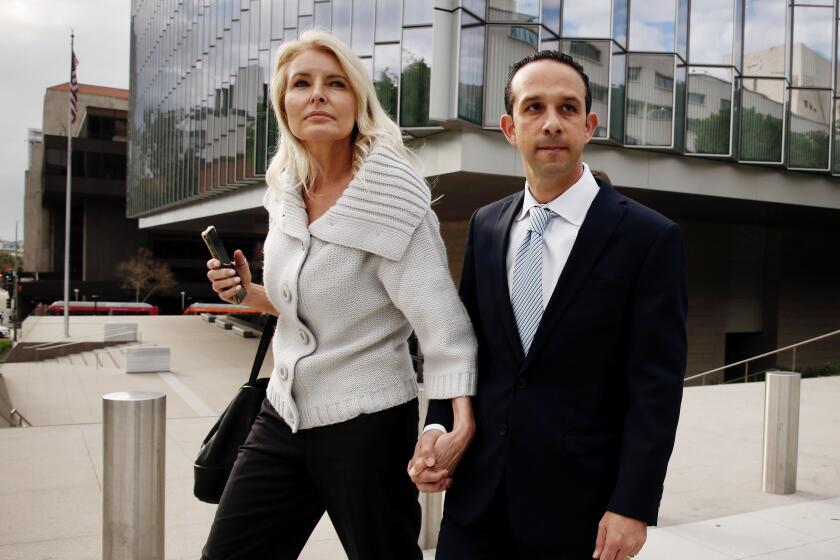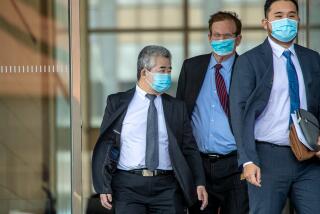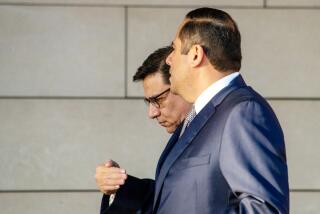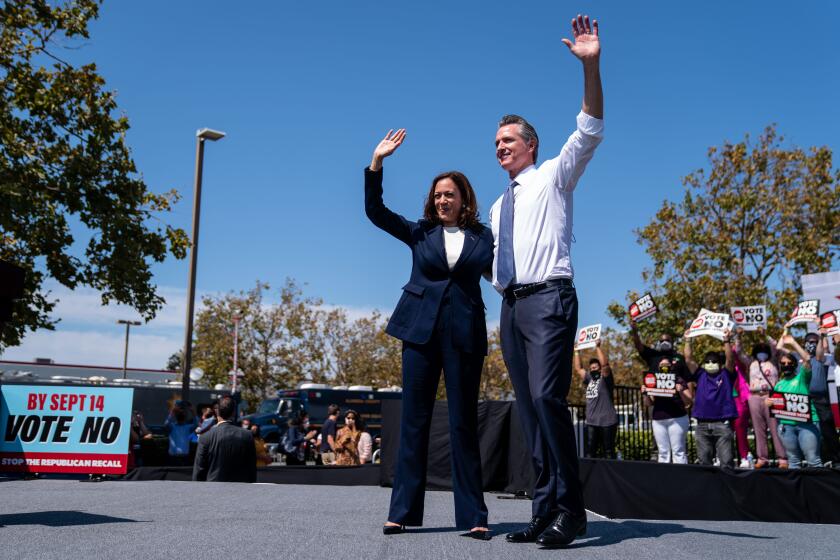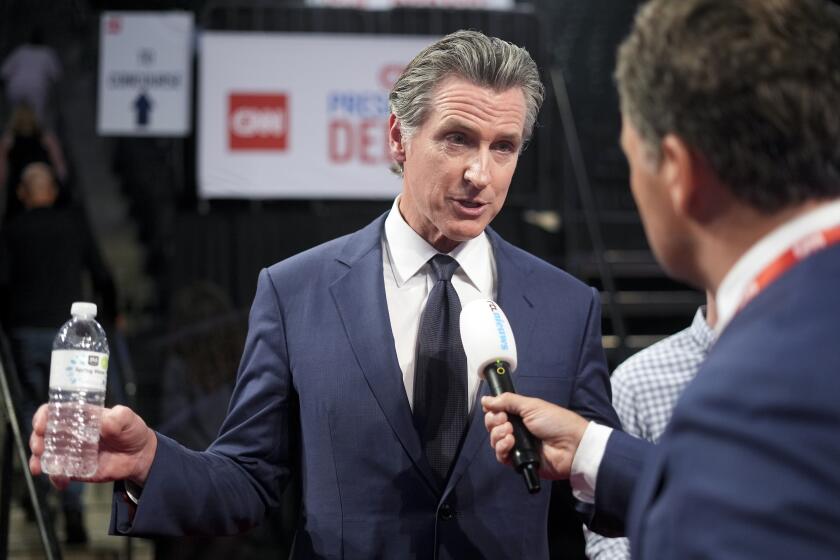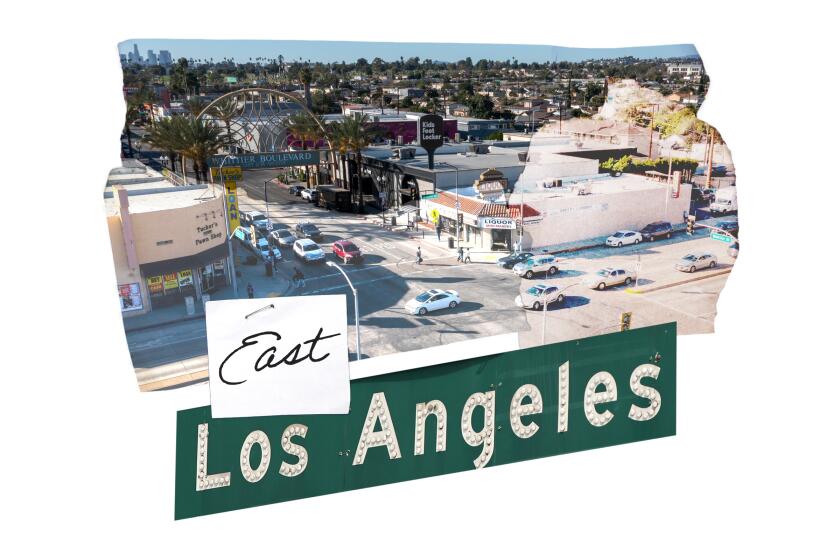Here’s a closer look at the ex-deputy mayor enmeshed in City Hall corruption probe
Raymond Chan earned praise at City Hall for his eagerness to smooth out city bureaucracy for developers, both as the head of Los Angeles’ building department and later as a deputy mayor focused on economic development.
When Chan stepped down from city service, Mayor Eric Garcetti credited him with helping to usher in L.A.’s development boom and lauded him as a “true public servant.”
Now court records in an ongoing federal probe into corruption at City Hall tell a different story. Prosecutors have alleged that a deputy mayor was paid by a real estate consultant to help shepherd a major project through City Hall — and leveraged his power as a city official to aid the development.
Although federal investigators did not name the former deputy mayor in court papers, details about his employment history make clear it is Chan, including the dates that he headed the Los Angeles Department of Building and Safety and when he was appointed deputy mayor for economic development. He has not been charged with a crime.
Chan has long been known to be under scrutiny by investigators: He was previously named in a federal warrant seeking evidence of possible crimes involving more than a dozen people, which surfaced more than a year ago. The warrant, served on Google, sought records from his email account.
But the latest filing spells out much more about what investigators are probing about the former deputy mayor and building chief, whose enthusiasm for fostering new development had long polarized his fans and critics.
The allegations surrounding such an important figure — a City Hall veteran who led a department crucial to real estate development — could deepen the distrust in local government that has been fueled by the federal investigation.
Chan did not respond to phone messages seeking comment. His attorney, Harland Braun, said Chan had done nothing wrong. Chan was recognized in the development industry as a “helpful, go-to person whenever help or advice was needed” and “never asked for or received anything in return for his own interest or benefit,” Braun said.
The new allegations emerged when one of Chan’s business associates became the third person charged in the sweeping investigation into alleged pay-to-play schemes at L.A. City Hall. Real estate consultant George Chiang has agreed to plead guilty to participating in a criminal enterprise that included helping a Chinese firm bribe an L.A. City Council member and paying a deputy mayor to usher along a development project.
Garcetti, asked about the federal allegations involving a former deputy mayor, said last week that he had “zero tolerance” for the alleged wrongdoing detailed by prosecutors.
As L.A. officials battle the coronavirus pandemic, a corruption scandal has fueled mistrust in City Hall.
Chan had long been seen as a friend to development. Six years ago, when Chan was chosen to permanently take over the building department, council members praised him for cutting red tape. Councilman Mitch O’Farrell said he had “made great strides in reducing the number of steps that it takes to get projects off the ground,” bolstering the economy.
Robert “Bud” Ovrom, who headed the building department before Chan, described Chan as a “Mr. Fix It” who was bullish about development and extremely accommodating to council members.
“If a councilman asked Ray, ‘What does two and two equal?’ he would answer by saying, ‘What do you want it to equal?’ ” said Ovrom, who added that he was stunned by the allegations in the federal case.
Chan emphasized his efforts to streamline L.A.’s permitting process. In a slideshow for employees after Chan got the job, the department urged employees to be flexible and focus on the intent of city codes. It offered up a scenario of a man who orders a set dinner in a restaurant and is told he cannot substitute fruit for Kahlua cream pie.
“Would the man eat at the restaurant again?” the slideshow asked. “Could the restaurant be more reasonably flexible?”
Robert P. Silverstein, an attorney who has represented neighborhood groups suing the city over development decisions, said he was disturbed that the building department seemed to see developers, not the public, as its customers. He argued that the department “reached a truly deplorable low under Chan,” who led the department as either its interim or permanent chief from 2013 to 2016.
Opponents of the Millennium Hollywood skyscraper project, which was thwarted by legal challenges brought by Silverstein, argued that Chan had a conflict of interest because his son was a paid intern at a law firm that represented the Millennium developer. Silverstein complained that “instead of cleaning house, Garcetti promoted Chan to deputy mayor” in 2016.
Chan said shortly after the complaint was submitted that he had been cleared of wrongdoing. A Garcetti spokesman said the matter “was referred to the Ethics Commission, which declined to take any enforcement action.”
In federal filings last week, prosecutors laid out a bribery plot involving Chiang, his business partners and an unnamed Los Angeles City Council member. Details in court filings have made clear that the politician is Councilman Jose Huizar, whose attorneys have repeatedly declined to comment.
Prosecutors also detailed the role of “Individual 1,” describing him as a former deputy mayor who first met Chiang at an event hosted by the Chinese firm that pursued the hotel-and-residential project involved in the alleged bribes.The man told Chiang he was well-respected as the general manager of the building department, their filing said.
The unnamed man later asked over lunch whether Chiang was interested in consulting on downtown development projects and offered to introduce Chiang to city officials, according to the plea deal.
Individual 1 “indicated that his goal was to ensure the success of Chinese projects in Los Angeles,” prosecutors said. He instructed Chiang to set up a consulting company to carry out his goals, and Chiang formed Synergy Alliance Advisors,according to the federal filings. The two later formed CCC Investment Group, which worked with development companies.
Chiang became a consultant on a planned project that would redevelop the Luxe City Center Hotel across from the L.A. Live entertainment complex, proposed by the Chinese firm Shenzhen Hazens. Prosecutors did not name the development involved in the alleged bribery scheme, but details in their filings — including the number of hotel rooms and residential units and the dates of City Hall votes — match the downtown project.
The plea deal states that the deputy mayor reached an agreement with Chiang to help with the planned project in exchange for “future payments.” While the deputy mayor was still working for the city, he prepared weekly lists of tasks for the project, led project meetings and assigned tasks to Chiang to advance the project, according to the plea deal.
He also leveraged his official position to pressure subordinates to take favorable steps for the project, set up a meeting between the planning department and company officials pursuing the development, and met with a member of the City Planning Commission to urge them to approve it, prosecutors alleged. Months after he left his city job in 2017, he was paid $112,000 for his assistance with the project as deputy mayor, according to prosecutors.
Shortly after leaving his city job, during the period when he was barred from lobbying city officials, the former deputy mayor asked a top staffer to an unnamed council member — identified only as “City Staffer D” — to ask a Garcetti staffer to pressure the commission to approve the project, according to prosecutors. Soon afterward, Chiang set up a consulting agreement to benefit a relative of City Staffer D, the filing states.
The Times also reported last year that while serving as deputy mayor, Chan had raised tens of thousands of dollars for Asian Pacific American Heritage Month celebrations from real estate developers who were seeking city approvals or awaiting building inspections.
Chan told a council aide that he had secured a $10,000 donation from Shenzhen Hazens. Experts said such fundraising activities are legal but could raise ethical concerns, depending on how much influence Chan had over those companies.
More to Read
Start your day right
Sign up for Essential California for news, features and recommendations from the L.A. Times and beyond in your inbox six days a week.
You may occasionally receive promotional content from the Los Angeles Times.
